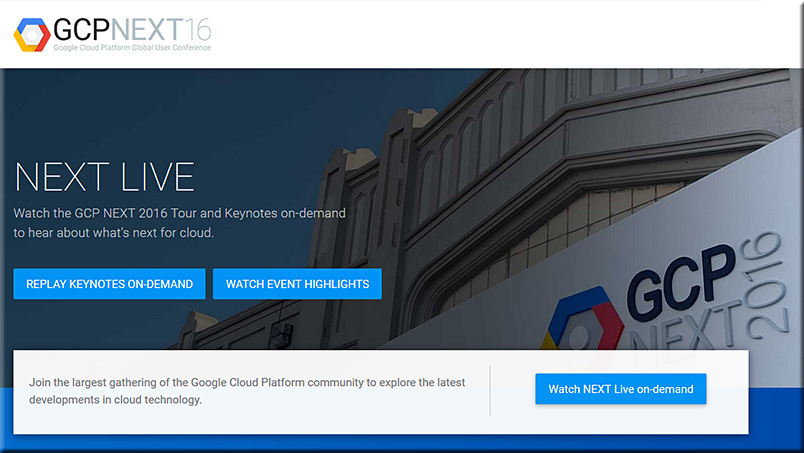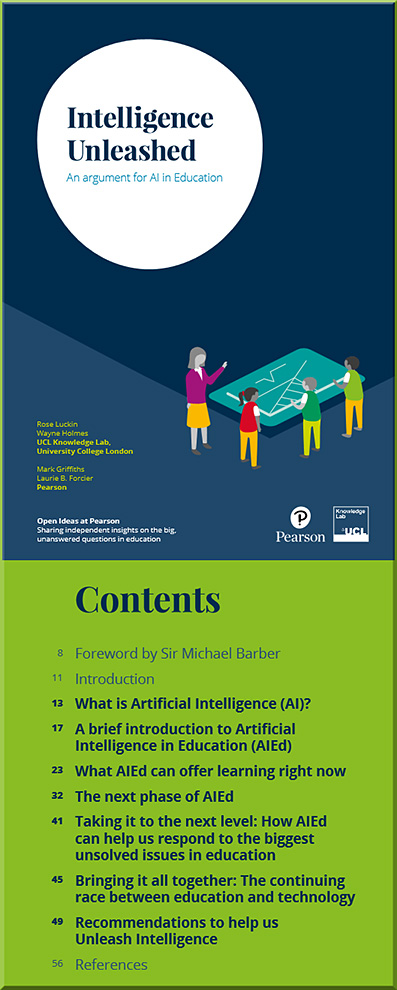Now anyone can use Google’s deep learning techniques — from futurism.com by Sarah Marquart
In Brief:
Google announced a new machine learning platform for developers. The company is also open-sourcing tools such as Tensorflow to allow the community to take its internal tools, adapt them for their own uses, and improve them.
…
Google has announced a new machine learning platform for developers at its NEXT Google Cloud Platform user conference. Eric Schmidt, Google’s chairman, explained that Google believes machine learning is “what’s next.”
Using artificial intelligence in the classroom — from educationdive.com by Erin McIntyre
Dive Brief:
- After Google’s artificially intelligent (AI) computer system beat world champion “Go” player Lee Sedol of South Korea, some are wondering if man-made neural networks can be applied in educational settings to benefit learning.
- Companies like Pearson have begun to examine the subject; the company recently released a pamphlet called Intelligence Unleashed: An argument for AI in Education that argues software may soon be able to provide instant and deeper feedback regarding student progress, eliminating traditional standardized testing.
- Pearson also conceptualized something called a “lifelong learning companion” for students, which essentially could be seen as an interactive cloud that asked questions, provided encouragement, offered suggestions and connected learners to resources.
Excerpts:
ALGORITHM
A defined list of steps for solving a problem. A computer program can be viewed as an elaborate algorithm. In AI, an algorithm is usually a small procedure that solves a recurrent problem.
MACHINE LEARNING
Computer systems that learn from data, enabling them to make increasingly better predictions.
DECISION THEORY
The mathematical study of strategies for optimal decision-making between options involving different risks or expectations of gain or loss depending on the outcome.
It can be difficult to define artificial intelligence (AI), even for experts. One reason is that what AI includes is constantly shifting. As Nick Bostrom, a leading AI expert from Oxford University, explains: “[a] lot of cutting edge AI has filtered into general applications, often without being called AI because once something becomes useful enough and common enough it is not labeled AI anymore.” Instead, it is considered a computer program, or an algorithm, or an app, but not AI.
Another reason for the difficulty in defining AI is the interdisciplinary nature of the field. Anthropologists, biologists, computer scientists, linguists, philosophers, psychologists, and neuroscientists all contribute to the field of AI, and each group brings their own perspective and terminology.
For our purposes, we define AI as computer systems that have been designed to interact with the world through capabilities (for example, visual perception and speech recognition) and intelligent behaviours (for example, assessing the available information and then taking the most sensible action to achieve a stated goal) that we would think of as essentially human.
IBM’s Rometty wants you to know they’re a ‘cognitive solutions cloud platform company’ — from barrons.com by Tiernan Ray
Excerpt:
Rometty says she is the first IBM chief to ever offer a keynote at the show [CES]. Her framework for everything this evening is that the “future is cognitive,” and we’re headed to a “cognitive IoT.”
…
What happens when everyone becomes digital, she asks. What will differentiate people is understanding all that data. That is the “cognitive era.” “Cognitive is an era of business and an era of technology,” she says. 80% of data out here is “black, invisible,” and “that’s what’s changing,” she says.
Rometty clarifies cognitive is not synonymous with A.I. It is not about systems you program. It is about systems that learn.
…
Her point is that all that “vast IoT data is going to do nothing for you unless you can bring cognitive to it.”
Her big point: “IBM is no longer a hardware, software company,” but a “cognitive solutions cloud platform company.”
SoftBank’s Pepper robot to get even brainier with IBM’s Watson technology — from thenextweb.com by Natt Garun
Excerpt:
When it launched last year, SoftBank’s emotion-reading robot Pepper sold out in just one minute despite its limited utility. Now, Pepper’s about to get smarter thanks to a partnership with IBM to integrate Watson cognitive system into its brains.
With Watson, developers hope to help Pepper understand human emotions more thoroughly to appropriately respond and engage with its users. IBM and SoftBank say the collaboration will also allow Pepper to gather new information from social media to learn how people interact with brands so it knows how to personally reach out to people.










